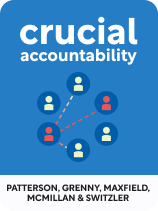

This article is an excerpt from the Shortform book guide to "Crucial Accountability" by Kerry Patterson, Joseph Grenny, et al.. Shortform has the world's best summaries and analyses of books you should be reading.
Like this article? Sign up for a free trial here .
Why should you learn how to hold someone accountable? What is an accountability conversation?
According to the book Crucial Accountability, learning how to hold someone accountable strengthens relationships and organizations. These can be intimidating conversations to have, but in the end, they’re worth it.
Read more on how to hold someone accountable.
What’s an Accountability Conversation?
Accountability conversations are the crucial and complicated discussions we have when someone breaks a promise, behaves badly, or otherwise fails to meet our expectations. When these situations arise, we are forced to decide whether or not to address the issue. We make this decision by drawing up a cost-benefit analysis in our head—is the effort of bringing up the affront worth the possible consequences? When learning how to hold someone accountable, we must decide if the conversation is worth having.
Most people choose to remain silent after doing this mental math due to the underlying fear that speaking up will damage their relationship with the people involved—even if it means perpetuating and worsening the issue. However, management and communication experts Kerry Patterson, Joseph Grenny, David Maxfield, Ron McMillan, and Al Switzler argue that if we learn to effectively hold accountability conversations, we can achieve our desired outcome and improve our relationship with the other person. Most times the issue is worth addressing, you just may be afraid or not know how to hold someone accountable.
Accordingly, Crucial Accountability is a step-by-step guide that teaches people how to plan, execute, and follow up on accountability discussions to maintain healthy relationships and effective organizations. This book will help you master how to hold someone accountable.
(Shortform note: Experts explain that we often choose silence over speaking up because this is what we learned from our parents during childhood—our communication skills, both good and bad, are largely formed by observing others communicate when we’re young. To unlearn poor communication skills, we need to consciously learn to effectively address issues like accountability. This is the purpose of Crucial Accountability.)
Why These Conversations Matter
The authors deem accountability conversations crucial because they’re high-stakes conversations where opinions differ and emotions run high. Consequently, handling these situations poorly could spell disaster. If we fail to plan out the accountability discussion and don’t approach it properly, we might:
- Address the wrong issue.
- Bring up issues that are no longer relevant, or not important enough to discuss.
- Unfairly accuse someone of ill-intent.
- Enter the conversation hot-headed and end up in an explosive argument.
If we follow any of these paths, we’re unlikely to effectively resolve the problem and might create additional problems, such as harming our reputation or damaging our relationship with the other person. This is why you want to prepare for these conversations by learning how to hold someone accountable.
In addition, the authors caution that if we try to avoid these potential consequences by simply ignoring the issue and not confronting the other person, we might end up acting out our feelings unknowingly and creating more problems than we started with.
To prevent these adverse effects, the authors outline the steps required to have an effective accountability conversation. First, they discuss how to identify the key issue to address and how to see the issue from the other person’s perspective. Next, they walk us through how to maintain a safe environment while initiating the discussion, and how to involve the other person in identifying solutions. Finally, they explain how to close the conversation and follow up on the chosen solution. The authors also include a final section to address outlying situations where the typical process may not work, and advise us on how to handle these.
| The Importance of Planning Difficult Conversations Experts in the field of business management, communication, and psychology all argue the same point: You need to plan out a difficult conversation before initiating it to ensure a successful outcome. In 12 Rules for Life, psychologist Jordan Peterson corroborates the authors’ argument that you must plan a crucial discussion to effectively execute it. He explains that if we communicate our interpersonal conflicts without planning ahead, we risk inciting emotional reactions from the other person such as resentment, jealousy, frustration, and even hatred. Like the authors of Crucial Accountability, Peterson notes that if we ignore an issue because we fear these emotional reactions, we might create more negative consequences, such as building up negative emotions towards the other person or allowing the issue to persist. Either way, these outcomes will damage our relationship with the other person. |

———End of Preview———
Like what you just read? Read the rest of the world's best book summary and analysis of Kerry Patterson, Joseph Grenny, et al.'s "Crucial Accountability" at Shortform .
Here's what you'll find in our full Crucial Accountability summary :
- How to broach sensitive conversations with loved ones and coworkers
- How to prepare for, execute, and follow up on accountability conversations
- How to solve issues while improving your relationships






